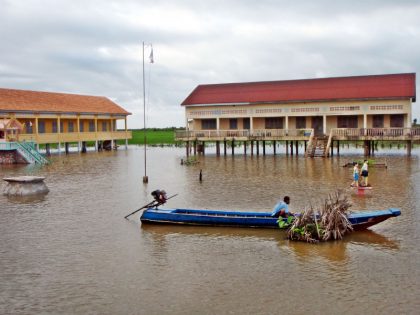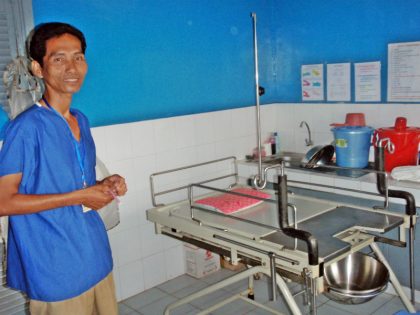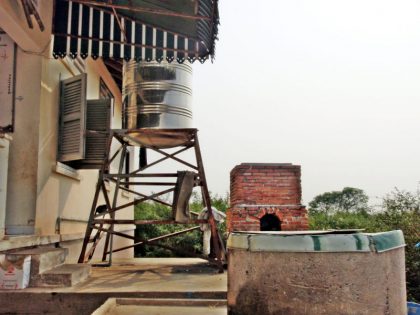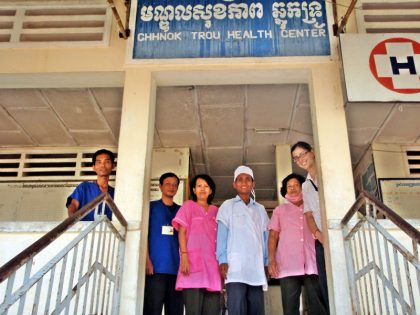 Location
Location
Chnouk Tru Village, Ponely Commune, Boribo District, Kampong Chhnang City, Cambodia
Community Description
Chnouk Tru is a floating village located on the Tonle Sap River about 5 kilometers off the national highway. In the floating village a person’s livelihood is completely determined by the ebb and flow of the river, which swells to four times its size in the rainy season.
Everything in Chnouk Tru is floating: families live on homes on floating bamboo and tied up to their neighbors’ houses, there is a floating market, gas stations, cell phone shops, and a wedding hall. There is a stilted health center and primary school that students and patients must take a boat to during the rainy season.
 The river is their only source of water and it is used for all of their cooking, cleaning, and bathing needs. Toilets are nothing more than a missing slat in an enclosed area for privacy in a corner of the house.
The river is their only source of water and it is used for all of their cooking, cleaning, and bathing needs. Toilets are nothing more than a missing slat in an enclosed area for privacy in a corner of the house.
A serious lack of sanitation exists in Chnouk Tru due to the community’s dependency to the river as their sole water source. While the majority of Chnouk Tru’s residents make a living by fishing, there are many unemployed residents in the area and many residents of the floating villages are displaced people or families who are unable to buy land. Floating village residents also suffer from higher rates of alcoholism, domestic violence, illiteracy, theft and HIV/AIDS than the rest of the country.
The Chnouk Tru Health Center offers the following services to the community: birth spacing consultations, vaccinations, maternity services, and basic medicine to treat dehydration, diarrhea, fever and general pains.
 The health center, along with the rest of the community, is suffering from severe lack of access to clean water. Currently, the health center has one well without a pump. The health center staff must draw water manually to bring water into the bathrooms and maternity ward. This contaminated water is currently what is being used for all health services, including the bathing of newborns.
The health center, along with the rest of the community, is suffering from severe lack of access to clean water. Currently, the health center has one well without a pump. The health center staff must draw water manually to bring water into the bathrooms and maternity ward. This contaminated water is currently what is being used for all health services, including the bathing of newborns.
The health center is equipped with a rainwater harvest tank which supplies them with water during the rainy season, as well as piping that brings the rainwater directly into the maternity room. However, because of the proximity to the river, many birds land on the roof and their excrement ends up in the runoff water, contaminating the rainwater tank.
Project Description
This project is to build a clean water facility that will bring filtered water into the maternity room of the health center.
 A motor will be purchased to bring water out of the well and feed it into the rainwater tank. The rainwater tank will then feed into the water filter, purchased by the health center. The filtered water will then be stored into a clean basin until it is needed to be fed directly into the maternity room.
A motor will be purchased to bring water out of the well and feed it into the rainwater tank. The rainwater tank will then feed into the water filter, purchased by the health center. The filtered water will then be stored into a clean basin until it is needed to be fed directly into the maternity room.
Additionally, since the area for the tanks in the health center is so small, the rainwater tank will be raised one meter to make space for the filter and basin that will be stored under the rainwater tank.
Project funds will be used to purchase the materials and pay for the local labor.
Project Impact
600 patients a month (including 50-70 new babies per month!) plus 9 health center staff will be served.
Peace Corps Volunteer Directing Project
Keiko Valente
Comments
This project provides tremendous benefits for the health center patients and staff. It will have a significant impact on illness and disease.
Keiko has completed three other successful projects, Kraubau Well Project – Cambodia, Boribo Health Facilities Water Project – Cambodia, and Hun Sen Boribo School Water Project – Cambodia.
Dollar Amount of Project
$555.00
Donations Collected to Date
$555.00 + additional amounts for future projects.
Dollar Amount Needed
$0.00 – This project has now been fully funded through the generosity of Shannon Fosseen, of Mercer Island, WA, USA, in honor of Keiko Valente.
We encourage others to continue to donate using the Donate button below, and we will notify Peace Corps Volunteer Keiko Valenteof your donation. Additional funds will be used to fund the next project by Keiko and/or those of other PCVs in the country.
This project has been finished. To read about the conclusion of the project, CLICK HERE.